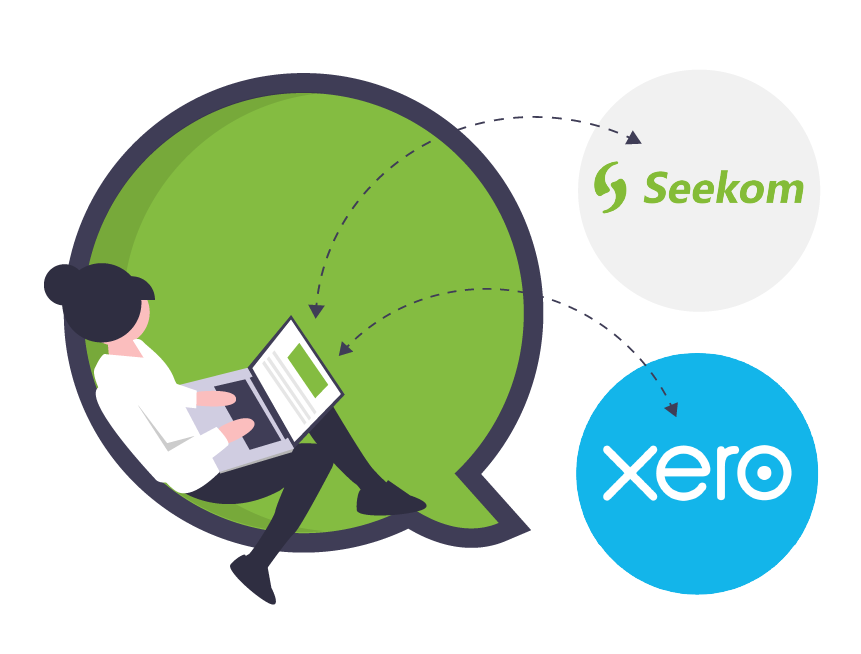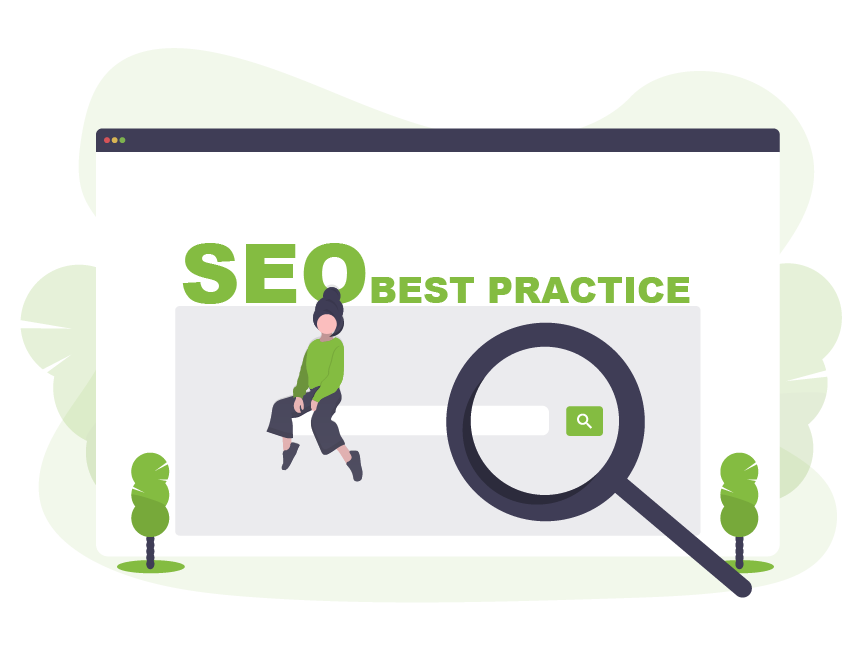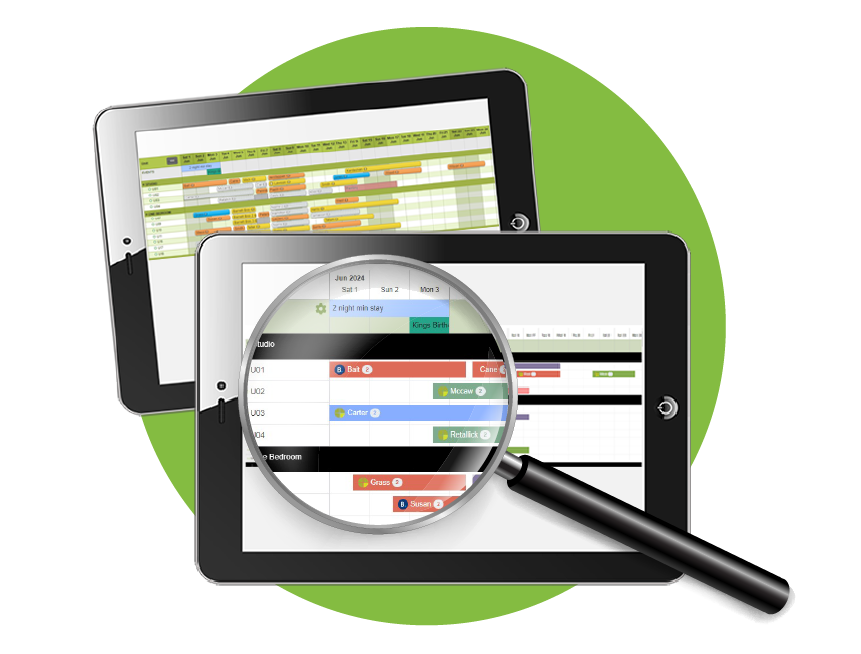A sneak peek at our 2024 plans
We’ve made it to late January and you all deserve a pat on the back for the amazing accommodation and hospitality experiences you have provided to travellers during what is traditionally one of the busiest times of the year.
As we head into a new year, know that team Seekom has your back. We’ve got some exciting developments planned for 2024 – many suggested by users – and we wanted to share a few of the most exciting.
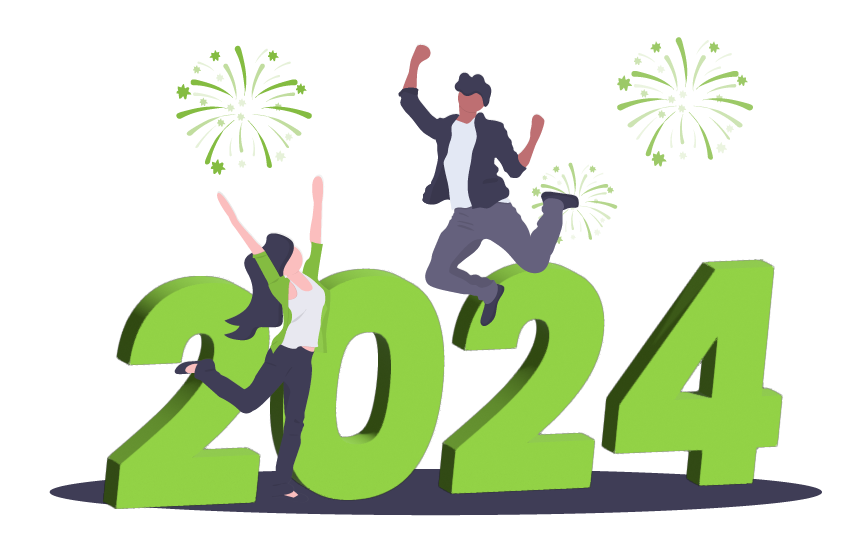
SMS upgrade and better calendar
Coming soon, we have a major upgrade to our SMS functionality that will provide lower rates and add a whole lot more options for the ways you can communicate with guests before, during and after their stay. We’re also redesigning and improving the look and feel of the bookings calendar found within Seekom, plus adding some enhancements to make it more user friendly and better optimised for mobile devices
System speed
We know how important it is for Seekom to load quickly when you are checking someone in or trying to create a report during a team meeting, so you can expect to see ongoing improvements to the speed of our system throughout the year.
Message options and refund protection
Looking further ahead, we’re exploring the possibility of extending our automated messaging options so you can reach guests via WhatsApp, and adding an option that would allow you to offer refund protection to your guests as an ‘opt in’ when they make a booking, to mitigate the financial impacts for you and your guests of any bookings that need to be cancelled.
Industry dashboard and AI
We’re also looking at introducing an ‘Industry Dashboard’ that would make benchmarking your property’s performance against key industry metrics easy. We think artificial intelligence has potential too, so we are starting the process of investigating whether adding AI into Seekom might make life easier for you and improve the guest experience. We will of course keep security front of mind and seek your views on AI throughout.
These are just a taste of what’s being considered for the year ahead, thanks in large part to the feedback users have provided via our Seekom Community. If you haven’t yet sent us your ideas, now’s a great time to do so.
With your insights and continued support, Seekom will remain ahead of the pack and continue playing its small but important role in the ongoing success of your business. Here’s to the future!
Sign Up For Updates
Recent Blog Post
Smarts to help you operate more effectively and efficiently. From guides of our systems and integrations to tips and tricks you can use every day - we've got you covered.
One of our amazing business development managers will be in touch to showcase our product to you and talk you through how we can help grow your business.
Contact Us
PO Box 9300, Marion Square, Wellington 6141
Phone (NZ) : +64 4 974 9588
Phone (UK) : +44 20 3835 5939
Support: support@seekom.com
Websites: webhelp@seekom.com
Copyright 2022 © Seekom Limited (NZ owned)
Unlocking Success: The Comprehensive Guide to SEO Benefits for Hospitality Businesses

Introduction:
In the fiercely competitive hospitality industry, staying ahead of the curve is crucial for success. One powerful tool that can significantly boost the online presence of hotels, motels, bed and breakfasts, and short-term rental properties is Search Engine Optimization (SEO).
In this article, we’ll explore the key benefits of SEO for businesses in the hospitality sector, focusing on optimising the meta titles, meta description and main headings (H1 tags) on your website pages. By doing this, you will give your pages the best possible chance of appearing in the search results when a potential guest is using Google, Bing or another search engine to look for accommodation.
Meta Title
Meta Description
H1 (Heading 1) Tag
Increased Visibility and Traffic:
There are some simple but effective steps you can take to improve the meta titles, meta descriptions and h1 tags on your website. These are all quick wins and will help improve how well your website is optimised for search engines.
Enhanced User Experience
Reviewing your meta titles, meta descriptions and h1 tags is about more than just improving your search results. It can also provide for a better user experience. Keep these key considerations in mind when doing your SEO optimisations.
Targeted Niche Marketing
One way to differentiate your property is to target a specific niche of the accommodation market. You can really get your niche targeting humming by tailoring your meta titles, meta descriptions and h1 tags to the niche you have identified.
Local SEO Advantage
Most search engines will prioritise content that is clearly marked as being in the vicinity of the location a guest is looking for when they search online, or close to the area they are physically conducting their online search from. The meta titles, meta descriptions and h1 tags on your page can play an important role in helping search engines understand the geographic locations your accommodation property’s pages are most relevant to.
What’s the perfect length?
When it comes to length, a good rule of thumb for the meta titles, meta descriptions and H1 tags on your website is as follows:

Note: Something you may not know, is that we also build websites. Many of our customers have Seekom built, fully managed websites which we maintain, including SEO management. If you’re interested in finding out more about this, get in touch.
Sign Up For Updates
One of our amazing business development managers will be in touch to showcase our product to you and talk you through how we can help grow your business.
Contact Us
PO Box 9300, Marion Square, Wellington 6141
Phone (NZ) : +64 4 974 9588
Phone (UK) : +44 20 3835 5939
Support: support@seekom.com
Websites: webhelp@seekom.com
Copyright 2022 © Seekom Limited (NZ owned)
Seekom makes harnessing Google free hotel booking links easy
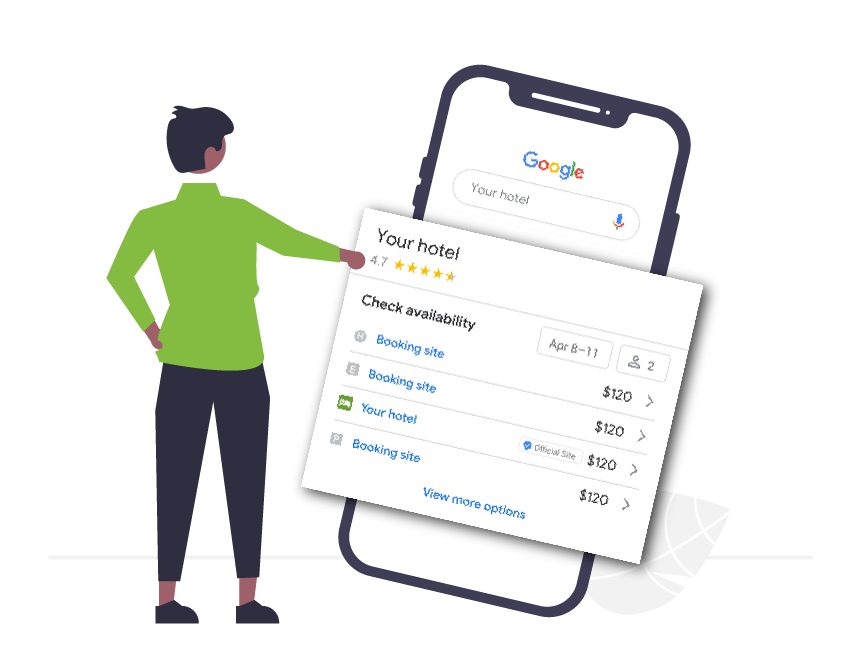
There are no secrets at Seekom. That’s why we want all our customers to know about a handy hack for accommodation providers that can set your business up with free booking links on Google. Yes you read that right: free booking links!
Our Channel Manager’s integration with Google Hotel Ads allows you to display your hotels’ direct rates and availability via free hotel booking links shown to prospective guests when they are looking for accommodation in your area on Google search.
This can be done by enabling the feature on the ‘Channel Manager’ page of Seekom iBex, increasing visibility of your accommodation and ensuring you can manage your rates, availability and room information in one place.
Even better, our behind-the-scenes API means rates and availability are updated in real time, ensuring the information displayed in your Google listings is always the same as in your ‘single source of truth’ Seekom system.
Millions of travelers around the world search for accommodation on Google every day, so taking advantage of Google Hotel Ads free booking listings is an easy choice to make.
Set up Google Hotel Ads
Check out our Google Hotel Ads Free Listings Set Up guide to find out how to enable the free listings direct from Seekom iBex.
Recent Blog Post
Smarts to help you operate more effectively and efficiently. From guides of our systems and integrations to tips and tricks you can use every day - we've got you covered.
Sign Up For Updates
One of our amazing business development managers will be in touch to showcase our product to you and talk you through how we can help grow your business.
Contact Us
PO Box 9300, Marion Square, Wellington 6141
Phone (NZ) : +64 4 974 9588
Phone (UK) : +44 20 3835 5939
Support: support@seekom.com
Websites: webhelp@seekom.com
Copyright 2022 © Seekom Limited (NZ owned)
Picking the right integrated payment solution for your online bookings
Online bookings make up a large portion of most accommodation providers’ revenue. That’s the reason many hotels, motels and holiday parks put so much effort into ensuring the booking engine on their website is easy to use and presents their accommodation in the best possible light.
However, there is another link in the online booking chain that isn’t always given the attention it deserves, and that’s the payment solution you chose to handle online card payments.
This is the technology that ensures payments made by your guests when they make a booking are transmitted securely to a payment processor and can ultimately make it into your bank account.
There are a myriad of payment solutions available, ranging from having separate arrangements with an acquirer, payment gateway intermediary and a network, to a simple one stop shop such as SeekomPay that provides a full payment solution with seamless integration into our Seekom property management software.
The payment solution you choose can have a big impact on your balance sheet and cash flow, so it’s worth taking the time to consider a few key points when deciding which one to use.
Integrations - will the payment solution work with your existing systems?
If you’ve invested a lot of time into your website, online booking engine and other systems, you will want to make sure the payment solution you choose plays nicely with them.
There are many solutions available that can be integrated with your platform of choice. For example, Seekom works seamlessly with our SeekomPay solution and we also offer integrations with a range of other payment gateway providers.
Before you settle on your payment solution, consider the systems you currently use and make sure they offer integrations with your preferred choice.
Security – is it PCI compliant and does it protect customer card details?
According to Statista, e-commerce losses to online payment fraud were estimated at US$41 billion in 2022. For this reason, security should be high on your list.
The gold standard for security, and the one all online merchants should aspire to, is Payment Card Industry Data Security Standards (PCI DSS) compliance. PCI DSS is a set of international security regulations implemented by card schemes to safeguard credit and debit card transactions while preventing the misuse of cardholders' personal information.
Using a PCI DSS compliant payment solution means transactions are securely encrypted and appropriate steps are taken throughout the transaction chain to protect your customers, and yourself, from the impacts of fraud.
Some payment solutions also offer ‘tokenisation’, which allows a customers’ credit card details to be securely stored. This is particularly useful if you have repeat bookings at your accommodation as it means guests won’t have to enter all of their card details to pay every time they book online with you.
Another consideration is whether the payment solution uses 3D Secure 2.0. This technology analyses each transaction made on a card and gives it a risk rating. If the transaction is deemed high risk, the customer is required to provide further evidence of their identity, often by entering a password or a code sent to their personal email or mobile device. This can reduce fraud stemming from stolen cards.
Payment options – what payment methods does the solution support?
The purpose of your payment solution is to help facilitate payments from your customers, so it makes sense to consider what payment methods it supports.
Think about the credit cards your customers use and any other ways they like to pay for their bookings and choose a solution that supports those methods.
Also consider whether or not you need a physical payment terminal. Payment terminals generally attract a monthly fee, and if your guests are almost entirely booking online (and rarely pay on site), you could be saving money by setting up a virtual terminal, if this is supported by the payment solution you're considering
Simplicity - does your payment solution involve several parties, or just one?
The world of payments is complex and it helps to understand the differences between various links in the payments ‘chain’, so you can assess where you might be able to minimise unnecessary overheads and agreements with different providers.
For payments to be fully processed, there are three key components:
- the payment gateway, which is the secure online page where a customer enters their credit card details to complete a transaction.
- a merchant acquirer, which is the financial institution that processes transactions they receive from the payment gateways or your on-site terminals, on your behalf. They act as the intermediary with the ‘schemes’ (e.g. Visa, Mastercard), to approve transactions and then settle those into your bank account.
- The network (e.g. EFTPOS NZ or Worldline), which sits between the gateway and the merchant acquirer.
Many accommodation providers will have separate agreements with each of these entities to enable payments to be processed, and in some cases they won’t be integrated with the accommodation provider’s property management system. Other payment solutions, such as SeekomPay, facilitate all of these components, making life simpler and more often than not, saving money.
Fees – what will your payment gateway cost you?
Another consideration is cost.
Payment gateway providers typically charge a monthly fixed fee, plus a fee on each transaction they process. Usually they’ll charge a minimum monthly fee if your transactions fall below a certain threshold.
Merchant acquirers charge a merchant service fee (a percentage of the transaction value). In some cases merchant service fees are charged as a ‘blended rate’, where all card types incur the same fees, while in other cases an acquirer may charge different merchant service fees depending on the card type, i.e. a rate for domestic debit and credit cards, a rate for commercial & premium cards and then an additional loading for international cards.
Networks charge a monthly fee in New Zealand.
The fees and rates you will pay for your full payment solution can vary, so it’s worth checking what kind of impact they will have on your bottom line. It’s also worth finding out about any other hidden fees, along with potential initial setup fees.
It’s a balancing act – looking at the best merchant service fee alone might not be the best deal for you if you’re also paying fees and charges to other providers, needing up to three separate direct debit arrangements and missing other components, such as the benefits of having a solution that is fully integrated with your property management software. And remember, you can offset your merchant service fee by applying a surcharge. This is common globally, including in Australia, and is becoming more accepted in New Zealand.
Support – if something goes wrong, who can you call?
While payment solutions should run without a hitch, payments involve complex infrastructure and there is always the possibility that something could go wrong. If the worst happens, will you be able to get support or information quickly?
For New Zealand and Australian accommodation businesses, there is benefit in choosing a local provider with a support team that operates in the same time zone. You will also want to make sure you can reach them on the phone if needed – there’s nothing worse than having an urgent issue and only being able to contact support by email.
So you’ve chosen your payment solution. What’s next?
Choosing the right payment solution is the hard part, but before you can start accepting credit card payments from guests for the first time or via your new chosen solution, you'll need to complete and submit a merchant application form.
This application is a prerequisite to establishing a merchant account with your chosen payments provider, and requests information such as business profile details, owner details, processing details, and transaction information. It allows the merchant acquirer to obtain a profile about you and your business and helps them assess the merchant application for
approval.
To ensure you don’t have to stop-start when completing the application form, be prepared and make sure you have certain things on hand, such as:
- a form of ID (e.g. driver’s licence, passport)
- proof of bank account
- proof of trading address
- average transaction size and annual turnover.
Completing application forms can be a daunting task and sometimes puts people off from changing providers, even though it is financially beneficial for them. At Seekom we make this process as easy as possible by pre-completing as much of the application as possible based on discussions with our customers. All they need to do is to complete the sections that
require proof of ID, bank account and trading address.
Once done, the application will be assessed for approval. Once approved, you will be onboarded as a merchant and can soon begin accepting guest payments.
If you opt to have a separate payment gateway intermediary you’ll need to complete a separate application in addition to the merchant application. The requirements for this application are typically not as intensive as for the merchant application.
Whatever you choose, it’s worth monitoring your performance and keeping your options open as online transactions can play a large role in the success of your accommodation business. In this regard it may be helpful to choose a provider that doesn’t lock you into a long-term contract – our own SeekomPay solution is provided on an open-term agreement so you can join and leave as you please.
Interested in using SeekomPay? We are offering to waive SeekomPay sign-up fees for any businesses that join before the end of October 2023. To find out more, visit our SeekomPay page.
One of our amazing business development managers will be in touch to showcase our product to you and talk you through how we can help grow your business.
Seekom Blog
Smarts to help you operate more effectively and efficiently. From guides of our systems and integrations to tips and tricks you can use every day - we've got you covered.
Contact Us
PO Box 9300, Marion Square, Wellington 6141
Phone (NZ) : +64 4 974 9588
Phone (UK) : +44 20 3835 5939
Support: support@seekom.com
Websites: webhelp@seekom.com
Copyright 2022 © Seekom Limited (NZ owned)

Interest in Pet Friendly Stays growing in lead up to summer
Visits to Seekom’s Pet Friendly Stays booking site are on the rise as New Zealanders rush to secure summer holiday accommodation with space for their paw-some furry friends.
The website, created as a central hub for New Zealand’s pet friendly accommodation, was viewed more than 5,000 times across September and October. Bookings via the site are increasing and a growing number of accommodation providers are listing their pet friendly accommodation to capitalise on a relatively untapped segment of the accommodation market.
Seekom General Manager Nicole Irschick said holidaymakers often struggled to find pet friendly accommodation and Pet Friendly Stays was helping to save them hours trawling the internet.
“We’re reaching a time of year when people look to lock-in their summer holiday plans. With many kennels and catteries fully booked and a growing number of New Zealanders looking to take their pets away on holiday with them, we’ve noticed a real uptick in traffic.”
According to a survey run by Companion Animals New Zealand, nearly two thirds of New Zealanders own pets, with dogs being the most common and cats coming a close second.
Pet Friendly Stays received a positive media reception when it launched last year, with coverage on Newshub, Today FM and in hospitality and leisure publications including Hotel Magazine and Australasian Leisure Management.
The site allows Seekom users to showcase aspects of their properties that pet owners might find relevant, including information about local amenities such as dog parks, pet-friendly walking trails, or nearby vet clinics.
At a glance: September visits to Pet Friendly Stays
- More than 5,000 website views across September and October
- Most searches were from Auckland, Christchurch and Wellington
- Bookings are on the increase in the lead up to summer 'howl-idays'.
Contact our support team using the demo request form below to find out more. Once set up, pet friendly accommodation can be managed directly from Seekom iBex, removing the need to manage rates and other property information on multiple platforms.
[hubspot type=form portal=9090717 id=ca66daee-ae0d-4a69-b3bf-4e9d97747c2a]
Sign Up For Updates
Recent Blog Post
Smarts to help you operate more effectively and efficiently. From guides of our systems and integrations to tips and tricks you can use every day - we've got you covered.
Contact Us
PO Box 9300, Marion Square, Wellington 6141
Phone (NZ) : +64 4 974 9588
Phone (UK) : +44 20 3835 5939
Support: support@seekom.com
Websites: webhelp@seekom.com
Copyright 2022 © Seekom Limited (NZ owned)







